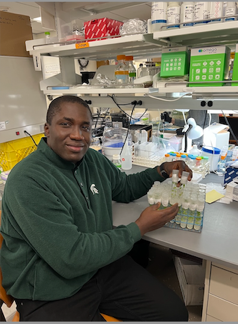Generations of Potato Breeding Bring Productive Results
This summer finds Joseph Ifeanyi Ulasi up to his elbows in potatoes—and loving every moment of it.

Joseph is at the forefront of an brilliant research initiative titled “Introgression and Pyramiding of Novel Genes for Diploid Potato Breeding,” under the guidance of Principal Investigator Dr. David Douches. In his work, Joseph pushes the boundaries of the science, building on years of collaborative progress in the long-running potato breeding program.
“Our project aims to enhance late blight resistance in diploid potato breeding by integrating novel resistance genes from various Solanum species with existing resistance genes,” Joseph explains.
Late blight—the devastating disease that contributed to the Irish Potato Famine—remains a serious threat to potato production worldwide. Joseph’s research focuses on improving resistance at the genetic level by drawing from nature’s own toolbox.
A key player in this effort is Solanum pinnatisectum, a wild potato species valued for its broad-spectrum resistance. Rich in Rpi genes (genes conferring resistance to Phytophthora infestans), this species holds promise for durable defense—but there’s a catch. It doesn't hybridize easily with cultivated potatoes.
Enter Solanum verrucosum, a bridge species that squeezes the possible out of the impossible. Developed as a connector by recent program graduate William Behling, S. verrucosum serves as a genetic “middleman,” facilitating successful gene introgression between wild and cultivated lines.

Joseph's role in the lab doesn’t end with research. Last Spring, he stepped into the classroom as a Teaching Assistant, bringing his passion for plant breeding to the next generation of students.
This project is just one piece of a rich mosaic of work dating back to 2018 (Read more here)



 Print
Print Email
Email




